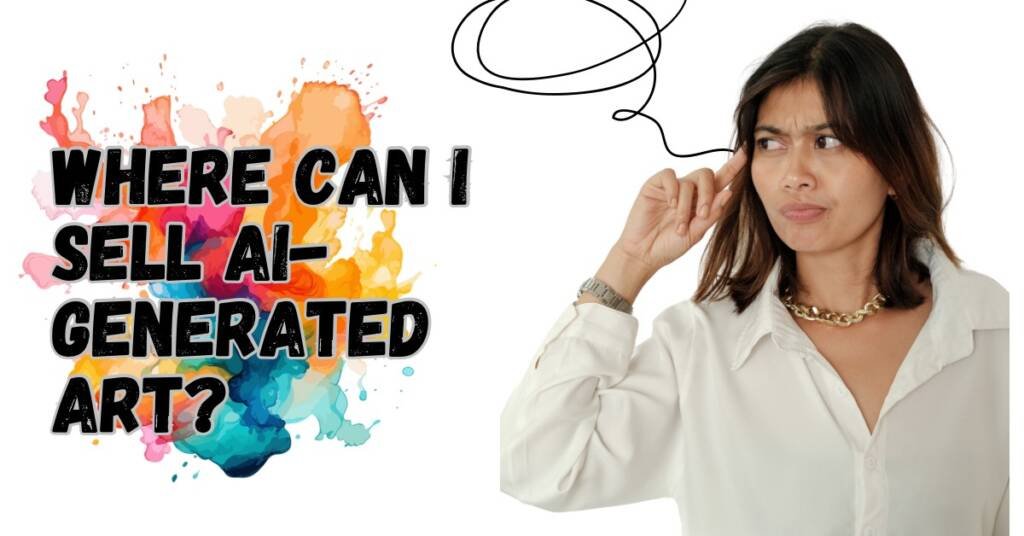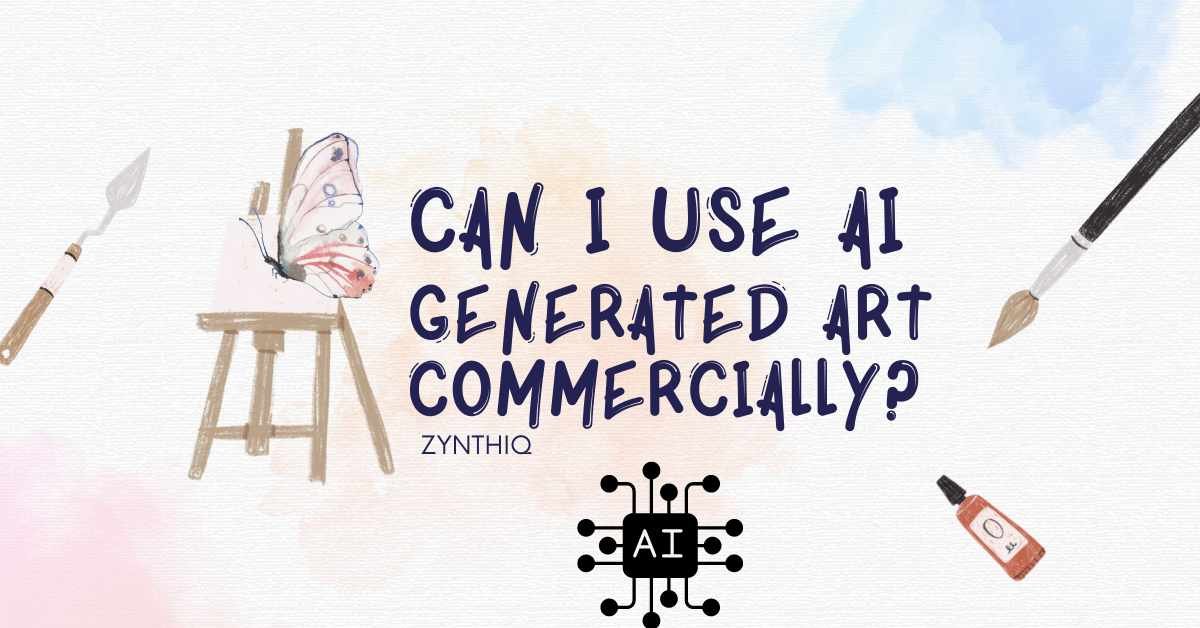Ah, the magic of AI art! You’ve conjured a digital masterpiece with a killer prompt, but can you turn it into, well, cash? The burning question: [ Can I use AI generated art commercially?] Hold on to your paintbrushes, artists! We’re about to untangle the legal side of selling your AI creations.
Using AI-generated art commercially depends on factors like platform terms, copyright laws, and ethics. Some platforms offer commercial licenses, but it’s wise to ensure no copyright infringement and acknowledge AI use.
Note: This article includes AI-generated sections for accuracy, all reviewed and edited by human experts.
Key-Points
How to make AI generated art?
Ever dreamed of creating captivating art but felt limited by artistic skills? AI art generation is here to democratize the creative process, making it possible for anyone to produce stunning visuals.
How Does It Work?
AI art generators are like magic wands powered by machine learning. You provide a text description, also known as a prompt, and the AI conjures an image based on its understanding of your words.
Craft your perfect prompt:
The key to successful AI art generation lies in your descriptive power. Think of your prompt as a detailed painting instruction for the AI. Here are some tips for crafting effective prompts:
- Be specific about the subject matter: Instead of a generic “cat,” describe a “fluffy Persian cat lounging on a window sill.”
- Use vivid adjectives and descriptive phrases to set the mood and style: “A hauntingly beautiful cityscape bathed in the golden light of dusk.”
- Use vivid adjectives and descriptive phrases to set the mood and style: “A hauntingly beautiful cityscape bathed in the golden light of dusk.”
- Reference artistic styles for inspiration: “A portrait painted in the style of Van Gogh, swirling with vibrant colors.”
- Generate and refine: Once you’re happy with your prompt, hit generate and watch the AI work its magic! Most tools allow you to generate multiple variations based on your prompt, so you can choose the one that resonates most with your vision.
- Pro Tip: Experimentation is key! Don’t be afraid to play around with different prompts and settings to see the range of creative possibilities the AI offers.
Can I use AI generated art commercially?
Can I use AI-generated Art Commercially? yes, The accessibility depends on the platform you choose. Here’s a breakdown:
- Free with limitations: Many popular platforms like Nightcafe Creator and Dream by WOMBO offer a limited number of free generations per user. This is a great way to experiment and see if AI art creation is for you.
- Freemium model: Some platforms provide basic features for free, but charge for features like higher resolution images or commercial use licenses.
- Paid subscriptions: For advanced features and unlimited generation, paid subscriptions are the way to go.
Expert Quote:
“AI art generation is a powerful tool, but understanding licensing is crucial. Using unlicensed art for commercial purposes can lead to copyright infringement.”
Sarah Jones, an intellectual property lawyer.
Can you use ai-generated art for book covers
The allure of AI-generated art for book covers is undeniable. It can be a budget-friendly way to create unique visuals that grab readers’ attention. But before you dive into the world of AI art, there are copyright considerations to address.
- Copyright murkiness: Copyright laws surrounding AI-generated art are still evolving. While the Artificial Intelligence (AI) itself cannot hold copyright, the question of who owns the rights to the created image—the user or the platform—is a point of ongoing debate.
- Potential for infringement: If the AI tool you use incorporates copyrighted elements into its creations, there’s a risk of infringing on existing copyrights.
- Choose your platform wisely: Look for platforms that offer clear licensing terms that grant commercial use rights for the generated art.
- Originality is key: Ensure the prompts you provide don’t reference copyrighted characters or styles to avoid potential infringement.
- Consider human collaboration: For maximum control and peace of mind, some authors combine AI-generated elements with human graphic design expertise to create unique and legally sound book covers.
Where can I sell ai-generated art?
The burgeoning world of AI art has opened doors for creative entrepreneurs. If you’re wondering where to sell your AI-generated masterpieces.

- Online marketplaces: Established platforms like Etsy and Redbubble allow you to sell prints, merchandise, and digital downloads featuring your AI art. These platforms offer a vast audience reach, but competition can be high.
- Dedicated AI art marketplaces: Look for online communities specifically catering to AI art, like Artsi and Fy! These platforms connect AI artists with potential buyers interested in the unique aesthetic of AI-generated art.
- Direct sales through your website: Having your own website allows for complete control over branding and pricing. This approach is ideal if you’ve already established an audience base or niche clientele.
Weighing the Pros and Cons of Using AI Images Commercially
it’s wise to weigh the advantages and disadvantages of using AI-generated visuals for commercial purposes.
Pros:
- Cost-effective: Compared to commissioning traditional artwork, AI-generated images can be significantly cheaper. This opens doors for budget-conscious businesses and startups.
- Speed and Efficiency: Generate unique visuals in minutes, drastically accelerating your design workflow. This is ideal for projects with tight deadlines.
- Uniqueness and Creativity: AI can create highly original and eye-catching visuals that stand out from the crowd. This can be a major advantage in a crowded marketplace.
Cons
- Copyright Uncertainty: Copyright laws surrounding AI-generated art are still evolving. There can be ambiguity regarding ownership and potential infringement on existing copyrights.
- Limited Control: While prompts guide the AI, you relinquish some control over the final image. This can be a challenge if you have a very specific vision in mind.
- Ethical Considerations: AI images can perpetuate stereotypes or biases based on the data they’re trained on. Careful consideration is needed to avoid unintended consequences.
Legal Aspects of Using AI Images for Commercial Use

- Copyright murkiness: Copyright law traditionally applies to original works created by humans. AI’s role in creation makes it unclear who holds the copyright – the user, the platform, or even the AI itself.
- Potential infringement: AI art generation tools are trained on massive datasets of images and text. There’s a risk that the AI might incorporate copyrighted elements into its creations, leading to unintentional infringement.
- Evolving licensing terms: AI art platforms often have complex licensing terms regarding commercial use. Carefully scrutinize these terms to understand your rights and limitations when using the generated images commercially.
Best Practices for Using AI-Generated Art Commercially
Here are some key steps to consider:
Start with a Clear Plan
Before diving into generation, clearly define how you intend to use the AI art commercially. Are you creating product packaging, social media graphics, or website visuals? Having a specific goal in mind will guide your prompt creation and ensure the generated art aligns with your commercial needs.
Refine and Edit
AI-generated art is often a springboard, not a finished product. Human intervention through editing and refinement is crucial to achieve a professional look. Many editing tools allow you to manipulate elements like color, composition, and style to fine-tune the AI-generated image to your exact requirements.
Stay Informed
The legal landscape surrounding AI art and copyright is constantly evolving. Stay updated on the latest developments by following industry publications or consulting with legal professionals specializing in intellectual property. This will help you navigate potential copyright issues and ensure you’re using AI art commercially within legal boundaries.
FAQs
1. What are AI images?
AI images are artworks created using artificial intelligence algorithms. These algorithms are trained on massive datasets of images and can generate unique and creative visuals based on text prompts or specific instructions.
2. Is AI-generated art copyright protected?
Currently, AI-generated art itself isn’t copyright protected in most jurisdictions. Copyright law typically requires human authorship, which AI lacks.
3. Can I use AI generated art commercially on YouTube?
It depends. If the art incorporates copyrighted elements (like specific images used to train the AI), using it on YouTube might require permission from the copyright holder. It’s always best to check the AI tool’s terms of service and consider copyright restrictions.
4. Can I sell AI-generated art on Etsy?
Similar to YouTube, selling AI art on Etsy depends on potential copyright issues within the artwork and the platform’s policies. Check Etsy’s terms and be cautious if the art seems to derive from copyrighted sources.
5. Is it legal to sell designs made by AI?
The legality of selling AI-generated designs hinges on copyright. If the design is entirely original and doesn’t contain copyrighted elements, selling it might be permissible. However, copyright laws surrounding AI-generated creations are still evolving.
6. Can I use Midjourney results for commercial use?
Midjourney’s terms of service determine commercial use rights. Check their terms for specifics, but generally, additional licensing might be required for commercial purposes.
7. Can we use some AI-generated art without permission?
Not necessarily. Even if the AI art itself isn’t copyrighted, it might contain elements derived from copyrighted sources. Using such art without permission could infringe on those copyrights.
8. Can you commercially use AI Art in a trading card online game?
The commercial use of AI art in a trading card game depends on the specific art and copyright considerations. Consult with legal counsel to navigate the complexities of copyright and AI-generated works.
9. Can I copyright AI art if I modify it?
Potentially. If your modifications add significant creative authorship to the AI-generated art, you might be able to copyright the modified work. However, copyright law specifics can be complex, so consulting a lawyer is recommended.
10. How do people sell their creations if there is no copyright protection?
Even if AI art itself isn’t copyright protected, creators can still sell their creations through various means. Some options include selling licenses to use the art, offering it as part of a service, or leveraging the art for marketing purposes.
11. Who owns the rights to images produced by an AI?
Currently, copyright ownership of AI-generated images is a grey area. In most cases, the AI tool developer might own the rights, but it’s crucial to check the specific tool’s terms of service.
